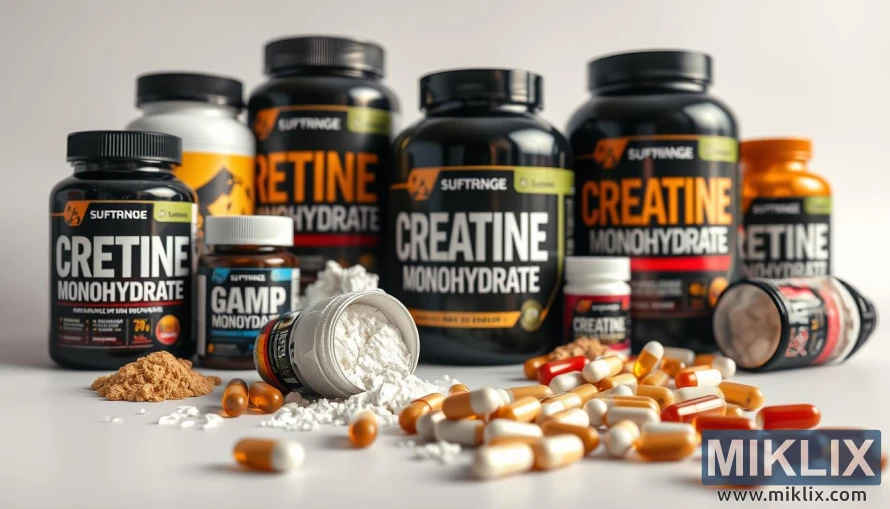Lift Heavier, Think Sharper: The Multifaceted Power of Creatine Monohydrate
Published: June 24, 2025 at 8:32:40 PM UTC
Creatine monohydrate supplements are highly valued by athletes and fitness enthusiasts for their numerous benefits. This naturally occurring compound in our bodies is vital for energy during intense exercise, boosting athletic performance. Studies confirm that creatine monohydrate enhances muscle growth and aids in recovery. It's a key component of recovery supplements, helping to maximize training results. Recent research also indicates that creatine may have positive effects on cognitive health. This adds another layer of benefit to this versatile supplement. The combination of these advantages makes creatine monohydrate a valuable addition to any fitness regimen.

Key Takeaways
- Creatine monohydrate significantly improves athletic performance.
- This supplement supports muscle growth effectively.
- It aids in recovery after intense workouts.
- Research highlights cognitive benefits of creatine.
- Widely regarded as one of the most effective recovery supplements.
What is Creatine and How Does it Work?
Creatine is a natural compound made from three amino acids: arginine, glycine, and methionine. It's mainly found in muscles and plays a key role in energy production. When we're active, creatine helps refill adenosine triphosphate (ATP) stores. ATP is essential for energy transfer in cells.
ATP levels directly impact our performance, most noticeably during intense workouts. About 50% of our creatine comes from protein-rich foods like red meat and seafood. The rest is made in the liver, pancreas, and kidneys.
The supplement mechanisms of creatine boost phosphocreatine levels in muscles. This increases our ability to resynthesize ATP. As a result, we can perform better in exercises and sustain high-intensity efforts for longer.
Understanding Creatine Monohydrate
Creatine monohydrate is the most common form of creatine used for supplements. It's a key choice for those looking to boost their energy during intense workouts. Available in various forms like powders, tablets, capsules, and energy bars, it caters to different preferences and lifestyles.
Research shows creatine monohydrate outperforms other forms, significantly improving muscle performance and strength. It's essential to understand its unique benefits compared to other protein sources. Creatine replenishes energy during intense activities, making it a vital dietary source for fitness and performance.
Improving Athletic Performance with Creatine Monohydrate
Creatine monohydrate is a key supplement for athletes looking to boost their performance. It's vital in high-intensity training, where quick energy is needed. Studies show it can increase strength, power, and muscle endurance.
Adding creatine to a workout routine aids in faster recovery between intense sessions. This is a big plus for athletes in sports like weightlifting, sprinting, and team sports. Research points to a 15% performance boost in high-intensity activities.
Bodybuilders and sprinters alike have seen real gains from creatine. It helps maintain energy and intensity, improving personal performance and team synergy in competitions.
Muscle Growth and Recovery
Creatine monohydrate is vital for muscle growth and recovery. It boosts protein synthesis, helping create new muscle fibers. The increased water in muscle cells also leads to rapid growth. This is because creatine raises insulin-like growth factor 1 (IGF-1) levels, a hormone key for muscle development.
Studies show that creatine supplements significantly improve lean body mass and muscle size during resistance training. Noticeable muscle gains can happen in just a few days. Creatine also aids in faster recovery, allowing athletes to train more often and intensely. This boosts their overall performance.

Creatine Monohydrate and Brain Health
Creatine monohydrate is not just for muscle strength; it also benefits brain health. The brain uses ATP a lot, mainly when we're focusing hard. Taking creatine can boost phosphocreatine in the brain, making more ATP available. This could help improve brain function, mainly for those who don't get enough creatine from their diet.
Studies suggest that older adults or those with low creatine intake can see better memory and thinking skills with creatine supplements. Early research also hints at creatine's role in fighting neurological diseases like Alzheimer's and Parkinson's. Yet, more research is needed to fully understand its effects on the brain.
Creatine Monohydrate for Older Adults
Entering the aging process brings a significant challenge: sarcopenia, the gradual loss of muscle mass and strength. Creatine offers more than just muscle gain for older adults. It enhances physical function and supports overall health. Studies show that creatine supplementation can combat age-related muscle loss, making daily tasks easier.
Older adults can see significant gains in muscle mass and strength with creatine. This can help counteract sarcopenia, leading to a better quality of life. Creatine not only increases muscle size but also boosts functional capacity. This allows individuals to stay independent for longer periods.
Creatine's safety for long-term use in older populations is well-established. It's increasingly recommended to include creatine in exercise programs. This combination offers a powerful strategy for promoting health and fitness in older adults. It helps preserve muscle health and mobility.

Safety and Side Effects of Creatine Monohydrate
Creatine monohydrate is known for its safety when taken in recommended amounts. Studies have shown it's safe for both short and long-term use. Over five years, no significant adverse effects were reported in healthy individuals. It's important for those considering supplementation to be aware of its safety.
While generally safe, certain groups should use caution. People with pre-existing kidney conditions or specific health concerns should consult a healthcare provider before starting. This ensures a personalized risk assessment based on their health status.
Common side effects of creatine monohydrate include:
- Weight gain due to increased water retention.
- Gastrointestinal discomfort, occurring in rare cases.
It's vital to listen to your body when starting any new supplement. Understanding interactions with other supplements, like caffeine, can enhance creatine's effectiveness. It also helps in minimizing health concerns.
Who Should Consider Using Creatine Monohydrate?
Creatine monohydrate is a go-to for those in high-intensity, short-duration sports. It's a game-changer for athletes in sprinting, powerlifting, and team sports. This supplement boosts energy for explosive movements, leading to better athletic performance.
It's not just for athletes; creatine helps increase muscle mass, recovery times, and strength. Vegetarians and vegans, with lower dietary creatine, see significant gains. Creatine also aids in muscle retention and recovery.
Even older adults can benefit from creatine. It helps maintain muscle mass and may even support brain health. In short, creatine is valuable for a wide range of individuals, from athletes to those looking to improve their overall health.
Combining Creatine Monohydrate with Other Supplements
Creatine monohydrate can be effectively combined with various performance supplements to enhance athletic performance and recovery. Pairing it with whey protein is a popular choice. This combination maximizes muscle growth after intense workouts.
Mixing creatine with beta-alanine and branched-chain amino acids (BCAAs) may provide synergistic effects. These improve strength and muscle endurance. Beta-alanine and BCAAs reduce fatigue and aid in muscle repair.
While these combinations can enhance results, it's important to consider caffeine's role. High doses of caffeine might counteract some benefits of creatine. It's recommended to monitor caffeine intake when using creatine as part of a larger supplement regimen.
Always prioritize safety by consulting with a healthcare professional or nutritionist before combining supplements. This ensures that the chosen creatine combinations align with individual fitness goals and health requirements.
Common Myths About Creatine Supplementation
Creatine myths often cloud the understanding of this popular supplement. One widespread notion suggests that creatine causes dehydration or kidney damage. Research consistently shows that it does not adversely impact kidney function in healthy individuals.
Another prevalent misconception is that creatine leads to significant weight gain. In reality, the weight gain typically stems from increased water retention and muscle mass, not fat accumulation. Many people also believe that only elite athletes can benefit from creatine supplementation. Studies reveal that creatine can enhance performance for individuals at all fitness levels, making it a versatile choice for many.
Addressing these supplement misconceptions is key for anyone considering creatine. An informed approach allows users to take advantage of the supplement's benefits while avoiding unnecessary concerns.
How to Use Creatine Monohydrate Effectively
To get the most out of creatine monohydrate, using it correctly is key. A daily intake of 3-5 grams is often advised for the best results. Some people choose a loading phase, taking about 20 grams daily for 5-7 days. Yet, studies suggest this might not be essential, as steady, lower doses can achieve similar long-term benefits.
For optimal creatine absorption, take it with a meal or snack high in carbs after your workout. This is because insulin helps move creatine into your muscles. Remember to stay hydrated while using creatine to avoid side effects. Drinking enough water is vital during this time.
Research and Evidence Supporting Creatine Monohydrate
Scientific research has extensively validated the benefits of creatine monohydrate. It's proven to boost athletic performance and cognitive abilities. Studies reveal that creatine supplementation enhances strength and power during intense workouts. This makes it a favorite among athletes and fitness enthusiasts, as it aids in muscle growth when combined with resistance training.
Recent findings also indicate that creatine can improve cognitive function, mainly in older adults or those with low creatine levels. The International Society of Sports Nutrition has issued statements affirming its safety and efficacy. This solidifies creatine's status as a well-studied and trusted supplement.
Conclusion
Creatine monohydrate is a scientifically backed supplement, known for its benefits in athletic performance and health. It aids in muscle growth, supports recovery, and may boost cognitive functions. Its versatility makes it a valuable addition to fitness and health programs.
Studies have shown creatine monohydrate to be safe and effective. It's recommended for athletes and older adults looking to preserve their physical abilities. Always follow informed supplementation guidelines. Consulting healthcare professionals can help create personalized plans based on individual needs and lifestyles.
Adding creatine monohydrate to your routine can be a natural way to enhance physical performance and overall health.
Further Reading
If you enjoyed this post, you may also like these suggestions:
- Stronger with Spinach: Why This Green is a Nutritional Superstar
- The Sweet Truth: How Strawberries Boost Your Health and Wellness
- Smart Supplementing: How Leucine Supports Muscle Preservation on a Calorie Cut
